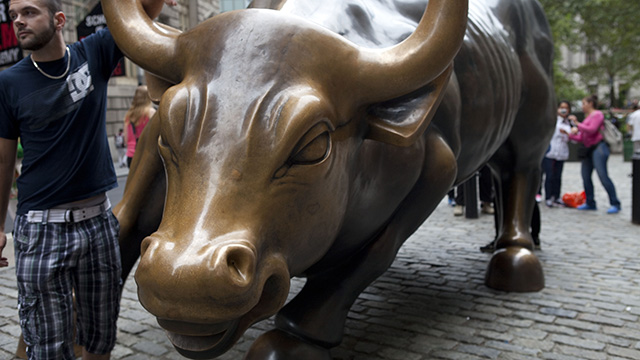This post first appeared at The Huffington Post.
Anyone who wants to understand the current state of the Democratic Party should pay close attention to what happened this week in the House of Representatives, where Democrats cut down a GOP-backed Wall Street deregulation bill. In response, the bill’s supporters avoided talking about who the legislation would have helped (hint: two big banks), focusing instead on calling its victorious opponents a bunch of flip-floppers.
“They were for this bill before they were against it,” said House Financial Services Committee Chairman Jeb Hensarling (R-TX).
Rep. Jim Himes (D-CT), a Goldman Sachs alum, made the same point more softly during an appearance on C-SPAN Thursday morning.
“The atmosphere is a little bit different,” Himes said. “I think there were 35 Democrats who voted yes. On similar legislation in the last Congress, that number was more like 75 or so. So yes, there were some folks who looked at the same thing this Congress and thought that they felt differently about it.”
Actually, 95 Democrats supported a very similar bill as recently as September. Both bills were 11-point packages chipping away at the 2010 Dodd-Frank financial reform law. The most serious attack of the bunch came in the form of a partial two-year delay of the Volcker Rule, which would ban banks from speculating in securities markets with taxpayer money. The bill would have allowed Citigroup and JPMorgan Chase to hold onto almost $50 billion in risky corporate debt packages known as collateralized loan obligations through 2019. Since that perk wasn’t included in the September version of the bill, the alleged flip-floppers can make a case that this time around, things just went too far.
But that doesn’t seem to be what’s really going on among today’s Democrats. For one thing, Democrats approved a previous two-year delay of the same Volcker Rule provision last spring, pushing it to 2017, and dozens of House Democrats spent much of 2013 and 2014 lining up to support bill after bill that dealt blows to the party’s second-biggest policy achievement of the Obama era.
This infuriated financial reform advocates. In isolation, many of these bills would have meant only minor trouble for Dodd-Frank. Others, however, were quite serious, and collectively, they functioned as a repeal strategy that may ultimately prove more effective than the GOP’s straightforward assault on Obamacare. They never became law because then-Senate Majority Leader Harry Reid (D-NV) didn’t bring them up in the Senate, but with Republicans now in control of the Senate, that firewall is gone.
The Democratic domestic policy agenda is remarkably uniform across the caucus, with one major exception. Nearly every House Democrat supports same-sex marriage, stronger environmental protections and increasing the minimum wage. But on bank reform, the party remains divided. Things have been shifting lately, however, and the 44 Democrats who switched their votes between September and January show which way the wind is blowing. They’re listed at the bottom of this article. As for the other supporters of the September bill, 12 aren’t in Congress anymore — a politically significant point in its own right — and four didn’t vote.
There’s nothing inherently terrible about flip-flopping. Historically, it’s a pretty important part of the legislative process, on everything from the Democratic Party’s embrace of the civil rights movement in the 1960s to the passage of the Wall Street bailout in 2008. Even Himes, mourning his defeat on C-SPAN, noted that a lot of people who thought unfettered finance was a good idea in the late 1990s recanted after the banking crash.
Elections, in particular, have a way of changing politicians’ opinions, and November was horrible for Democrats in almost every possible way. Economic policy factors stuck with a lot of liberals. Ballot initiatives to increase the minimum wage passed all over the country in districts blue and red, even as Democrats took a beating everywhere. Exit poll data showed that the economy remained the most important issue to voters (as it has in every election since 2008), and shepherded in Republicans, even though a robust majority didn’t think the GOP had a plan to make things better.
“People have separated Dems from the minimum wage,” Rep. Keith Ellison (D-MN) told HuffPost in December. “The last election, the problem is that voters believe [Republicans and Democrats are] all in on this cabal together, and nobody’s thinking about their families.”
The public is still angry about the bank bailouts. And even with the economy showing signs of improvement, voting for more Wall Street financial aid is an easy way to convince many constituents that you aren’t playing for their team.
All of that came to a head in the December vote on a major government funding bill. When top negotiators from both parties included a provision subsidizing risky derivatives trading in the package, many Democrats who had been quietly going along with the piecemeal dismantling of Dodd-Frank began trying to take down the spending bill over the bank perk. They came pretty close, and the final events of the vote — President Barack Obama and JPMorgan Chase CEO Jamie Dimon personally lobbying lawmakers for support — only added fuel to the bank reformers’ fire.
They appear to be picking up converts, as demonstrated by the 44 Democrats who came out against the Volcker Rule delay Wednesday. Several of those 44 were frequent Wall Street supporters in the last Congress — House Minority Whip Steny Hoyer (D-MD) and Reps. Joe Crowley (D-NY). Greg Meeks (D-NY) and Carolyn Maloney (D-NY) stand out as interesting changes.
“Wall Street reform is not only popular with consumers, but constantly under Republican attack,” one senior Democratic aide told HuffPost. “I’m glad that Democrats have realized that being pro-business doesn’t have to mean being pro-Wall Street.”
Of course, House Minority Leader Nancy Pelosi (D-CA) whipped Democrats hard on Wednesday to oppose the Volcker Rule delay, and issued a statement after the vote blasting the bill as a GOP rip-off of the American people. Pelosi is obviously a powerful person in the caucus, and when Republicans bring the same Volcker Rule bill up again next week under rules that will guarantee its passage, she’ll have less leverage, and some of the financial reform converts may revert to backing big banks.
But for the moment, it looks like the 2014 election has made Democrats focus a little more clearly on what happened in 2008.
These are the 44 Democrats who supported a version of Wall Street deregulation in September, but voted against it this week:
Rep. Corrine Brown (D-FL)
Rep. Tony Cardenas (D-CA)
Rep. David Cicilline (D-RI)
Rep. Jim Cooper (D-TN)
Rep. Joe Crowley (D-NY)
Rep. Susan Davis (D-CA)
Rep. Diana DeGette (D-CO)
Rep. Eliot Engel (D-NY)
Rep. Anna Eshoo (D-CA)
Rep. Sam Farr (D-CA)
Rep. Denny Heck (D-WA)
Rep. Brian Higgins (D-NY)
Rep. Mike Honda (D-CA)
Rep. Steny Hoyer (D-MD)
Rep. Steve Israel (D-NY)
Rep. Bill Keating (D-MA)
Rep. Ann Kirkpatrick (D-AZ)
Rep. Ann McLane Kuster (D-NH)
Rep. Jim Langevin (D-RI)
Rep. Nita Lowey (D-NY)
Rep. Michelle Lujan Grisham (D-NM)
Rep. Ben Ray Lujan (D-NM)
Rep. Carolyn Maloney (D-NY)
Rep. Doris Matsui (D-CA)
Rep. Betty McCollum (D-MN)
Rep. Jerry McNerney (D-CA)
Rep. Greg Meeks (D-NY)
Rep. Grace Meng (D-NY)
Rep. Beto O’Rourke (D-TX)
Rep. Ed Perlmutter (D-CO)
Rep. C.A. “Dutch” Ruppersberger (D-MD)
Rep. Linda T. Sanchez (D-CA)
Rep. Loretta Sanchez (D-CA)
Rep. Brad Sherman (D-CA)
Rep. Louise Slaughter (D-NY)
Rep. Jackie Speier (D-CA)
Rep. Eric Swalwell (D-CA)
Rep. Mike Thompson (D-CA)
Rep. Juan Vargas (D-CA)
Rep. Marc Veasey (D-TX)
Rep. Filemon Vela (D-TX)
Rep. Pete Visclosky (D-IN)
Rep. Tim Walz (D-MN)
Rep. Frederica Wilson (D-FL)
Reps. Jim Costa (D-CA), Tammy Duckworth (D-IL), Pete Gallego (D-TX) and Rick Nolan (D-MN) all voted for the bill in September, but did not vote on Wednesday.
Donte Stallworth contributed reporting.



